Orange County Bat Removal
Welcome to Orange County Bat Removal! We are California bat removal specialists. It is important to know that bats are protected by California law, and are beneficial animals to have in the environment. We do not kill any bats during our bat removal process. Never hire a pest control company or anyone who says they are a Orange County bat exterminator. For correct and effective bat removal, you want a company that specializes in humane bat colony extraction. Our process is not only the only legal method in California, but it is the most effective. We have a 100% success rate in our bat control process. We perform our industry-best 32-point inspection of your house or building, and seal shut all bat entry holes down to 1/4 inch as part of the removal process, during which we remove the colony via special one-way exclusion devices specific to your architecture. Once all bats are safely out, we permanenetly bat-proof the structure. We also provide guano (bat droppings) removal and decon. Click on our Orange County Bat Control Prices page to find out more about our prices for bat control work. We work 24/7/365, and would love to talk to you about your bat problem. Call us any time at 949-281-6657 to discuss it, discuss our pricing, and if you wish, set up an appointment at your convenience, often same-day.
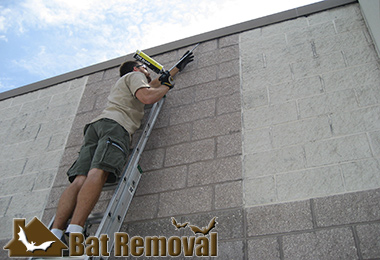
Orange County Building and Attic Inspections
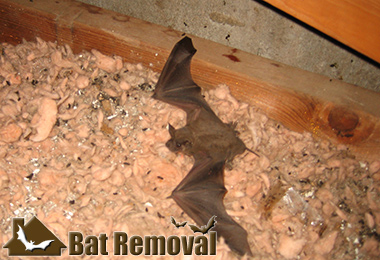
No-kill California Bat Extraction
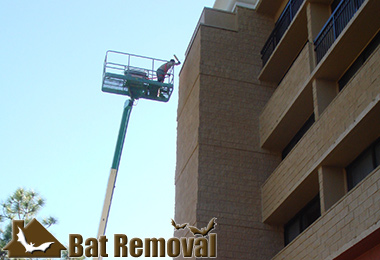
Guano Cleanouts - Serving all of California
Call 24/7 to discuss your bat problem.
Same-day or next-day appointments.
32-point inspection of your property.
Written estimates for bat removal project.
Fully state licensed and insured.
Residential and commercial service
100% no-kill Orange County bat extraction
Complete bat-proofing of your building
Compliance with all California, federal laws
Guano removal and attic decontamination
Our Service Range - 949-281-6657
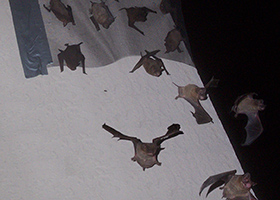
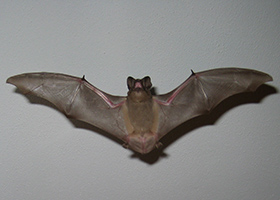
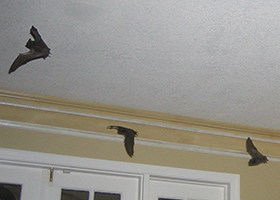
4 Signs of Bat's Nest in Your Attic
Bats are known to carry dangerous illnesses that can be transferred to humans and our pets. Therefore, you don't want them nesting in your attic. Be sure that you will periodically check your attic to ensure that the bats will not take residence in this area. By looking at some of the signs that we will mention below, you will be able to catch the infestation at the early stage.
Obvious Signs of Bat's Nest in the Attic
Bats prefer to live in the dark and undisturbed areas. This will guarantee them that they will stay protected from the predators and harsh weather elements. They can invade our house through a hole that has a diameter of 5/8 inch. Their common access point would be on eaves and chimney flashing.
1. Nauseating Scent
A nesting colony of the bats will usually be composed of large number of mother bats and their baby bats. The bat droppings and urine can accumulate fast in your attic that will be obvious on the irritating scent that will resemble the odor of a strong ammonia. In case there is nest of bat in your attic, you will first encounter the bat guano before you even see the bat physically. Some places where you can catch the droppings include the windowsills, porch, and decks.
2. Vocal Sound
The bats will communicate with each other using their piercing sound. At first, the sound that they will produce will not be persistent. However, as the colony becomes large, you will be able to hear their noise. The baby bats will also produce a unique noise that will help the mother bat distinguish them from the other baby bats in the colony. The noise that they create will be more pronounced during the night.
3. Scratches
Apart from the vocal sound that they produce, you will also hear the bat create scratching sound. The scurrying sound will often be heard when the bats are leaving the attic at night. Bats will be leaving your attic at night to forage for food, they will scurry out of their colony. You will also hear this when they are returning to the attic. The baby bats can also fell from their roosting ground. They will crawl down the surface that will produce the scratching sound.
4. Stains
The stains can also be a sign that a colony of bat is nesting in your attic. The bat will have grease on their fur. Constantly coming in contact with the wall will be the cause in the development of the rub marks. Look for the usual entry points of the bats where you will see the rub marks.
Once you see these signs, there may not be nothing much to do. Most species of bats are considered endangered and you don't want to hurt them. You are not allowed to disturb, damage, or harm them, their babies and their nesting ground. You must wait until the baby bats will be fully capable of leaving the nest.

